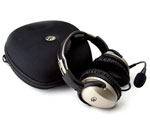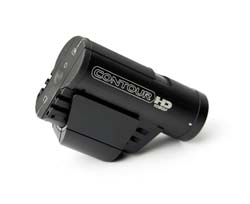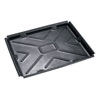Lightspeed Zulu

Who: Lightspeed Zulu
What: High quality ANR headset
Where: www.lightspeedaviation.com
Why: It's one of the top headsets on the market
Cost: $900
Pros:
- Excellent headset on all fronts
- Great customer service
- Trade-up program makes it within reach
Cons:
- Good headsets like Zulu are pricey
Fans of Lightspeed’s Zulu headset have another reason to spend money—there’s a new Zulu.
The new model has an updated look with a more angular ear cup and redesigned ear seals. The microphone is also all new in an effort to make it more noise-resistant. Overall, however, the look remains largely unchanged, and the headset retains its metal headband, silver ear cups, and black in-line control box.
Try on the old Zulu and new Zulu side by side and you’ll notice only minor differences in the ANR capability. Although, that’s somewhat irrelevant because the old Zulu did a great job at canceling out the engine noise. The headsets do allow different sounds to come through, which is an indication that engineers have further refined the ANR spectrum to make cockpit noise canceling more efficient.
The Zulu continues to impress on comfort. It’s one of the few headsets that can be worn for hours without fatigue. (Standard disclaimer applies on headsets. Fit is very personal and must be individually evaluated.) The company says the new model clamps 15 percent less than the previous Zulu, which is really saying something.
Finally, the all-new microphone has active noise canceling built in. While that doesn’t necessarily matter to the user, it will make intercom and radio transmissions much clearer and easier to understand.
Other than the service, one of the best aspects about buying a Lightspeed headset is the company’s trade-up program. Owners of various other Lightspeed headsets can get $400 in credit toward a new Zulu. And owners of non-Lightspeed headsets, such as a Bose X, can get anywhere from $100 to $400 off the purchase of a new Zulu. That’s a great deal on one of the undisputed top headsets on the market.
Raincoat
MotoSolutions Raincoat

Who: MotoSolutions Raincoat
What: Plexiglass wax to improve visibility
Where: www.motosolutions.com
Why: Because it's an inexpensive way to improve safety
Cost: $6
Pros:
- Great improves rain visibility
- Inexpensive
Cons:
- Have to remember to reapply
- Somewhat small applicators
Sometimes it’s the little things that matter. Such is the case with Raincoat, a small bottle that makes a big impact on the visibility out the front of the aircraft. Raincoat is a wax for plastic use only that beads water off the surface, thereby improving visibility. It’s the same theory as Rain-X for auto use.
The product comes with a series of wipes, an applicator sponge, and a buffer cloth. Application is fairly easy. Put it on the windscreen, buff it off, and Raincoat is applied and ready to go.
The results are impressive. We applied Raincoat to the right front windscreen of a Cessna Caravan, allowing a direct comparison with the pilot’s side. Our pilot reported dramatically increased visibility in rain. The flight also encountered some ice, and Raincoat didn’t negatively affect the TKS fluid being slung back from the prop either.
NFlightCam by Contour
Small, rugged, self-contained video cameras have become common accessories in sports ranging from mountain biking to sky diving—and video cameras are increasingly making their way into the cockpit to record flights. (See “ You Too Can Be On You Tube,” April 2011 AOPA Pilot.)
NFlightCam by Contour

Who: NFlightCam by Contour
What: Small HD action camera
Where: www.nflightcam.com; www.sportys.com
Why: Filming your flights is just cool
Cost: $499
Pros:
- Simple to use with only one on/off button and a slide that starts and stops video recording
- Light and easy to mount to a headset or glare shield
- Excellent video and audio quality
Cons:
- Audio cable and GPS chip add $199 to the total cost
- Sturdy, but not unbreakable
- No viewfinder (but laser pointer for aiming)
One of my favorite cameras, and by far the simplest to use, is the Contour HD. It’s streamlined and simple to mount in the cockpit or to an aviation headset, weighs just 4.3 ounces. The Contour HD has an internal microphone, but it was pretty much useless in noisy airplanes because it was overpowered by background noise.
Now, the NFlightCam allows pilots to match the Contour HD’s high-quality video images with excellent sound quality that eliminates background noise. The NFlightCam is a Contour HD with a Y cable attachment that plugs into standard aviation headsets. Simply plug your microphone jack into the NFlightCam and connect it to the panel in the airplane you’re flying. (It only fits one way, so it’s impossible to mess up.) Turn on the camera, and it records sound from your microphone as well as radio transmissions and everything said on the intercom.
The NFlightCam is a valuable flight training aid because everything your instructor and ATC say is recorded —and engine noise is totally absent. The NFlightCam also has an embedded GPS chip that records location, groundspeed, heading, and altitude. This information can be graphically displayed against a Google Earth backdrop on your home computer.
The camera is compatible with SD cards up to 16 GB. —Dave Hirschman
What’s hot
 Both WingXPro7 and ForeFlight Mobile HD recently released updates to their respective iPad applications. WingX now features ADS-B integrated weather (receiver required), enhanced terrain mapping, pinch-to-zoom moving map, and nice split-screen options with terrain, weather, and more. ForeFlight Mobile HD has added many new features, the most impressive of which is georeferenced approach plates and taxiway diagrams.
Both WingXPro7 and ForeFlight Mobile HD recently released updates to their respective iPad applications. WingX now features ADS-B integrated weather (receiver required), enhanced terrain mapping, pinch-to-zoom moving map, and nice split-screen options with terrain, weather, and more. ForeFlight Mobile HD has added many new features, the most impressive of which is georeferenced approach plates and taxiway diagrams.
 Baron Services announced at Sun ’n Fun in late March the ability later this year of XM weather capability for any portable device, including the iPad. Called Mobile link, the $200 box will integrate with the WX Worx receiver to show XM datalink products on the iPad. It’s the last piece of the iPad puzzle. When released, the Mobile link is expected to work with WingX, ForeFlight, Garmin’s PilotMyCast, and FlightPrep’s iChart.
Baron Services announced at Sun ’n Fun in late March the ability later this year of XM weather capability for any portable device, including the iPad. Called Mobile link, the $200 box will integrate with the WX Worx receiver to show XM datalink products on the iPad. It’s the last piece of the iPad puzzle. When released, the Mobile link is expected to work with WingX, ForeFlight, Garmin’s PilotMyCast, and FlightPrep’s iChart.
Hangar floor got you down? Drip Pans USA recently introduced a series of interlocking hangar floor drip pans. The pans come in multiple sizes, and cost $29.95 each. You can find them at www.drippansusa.com.



